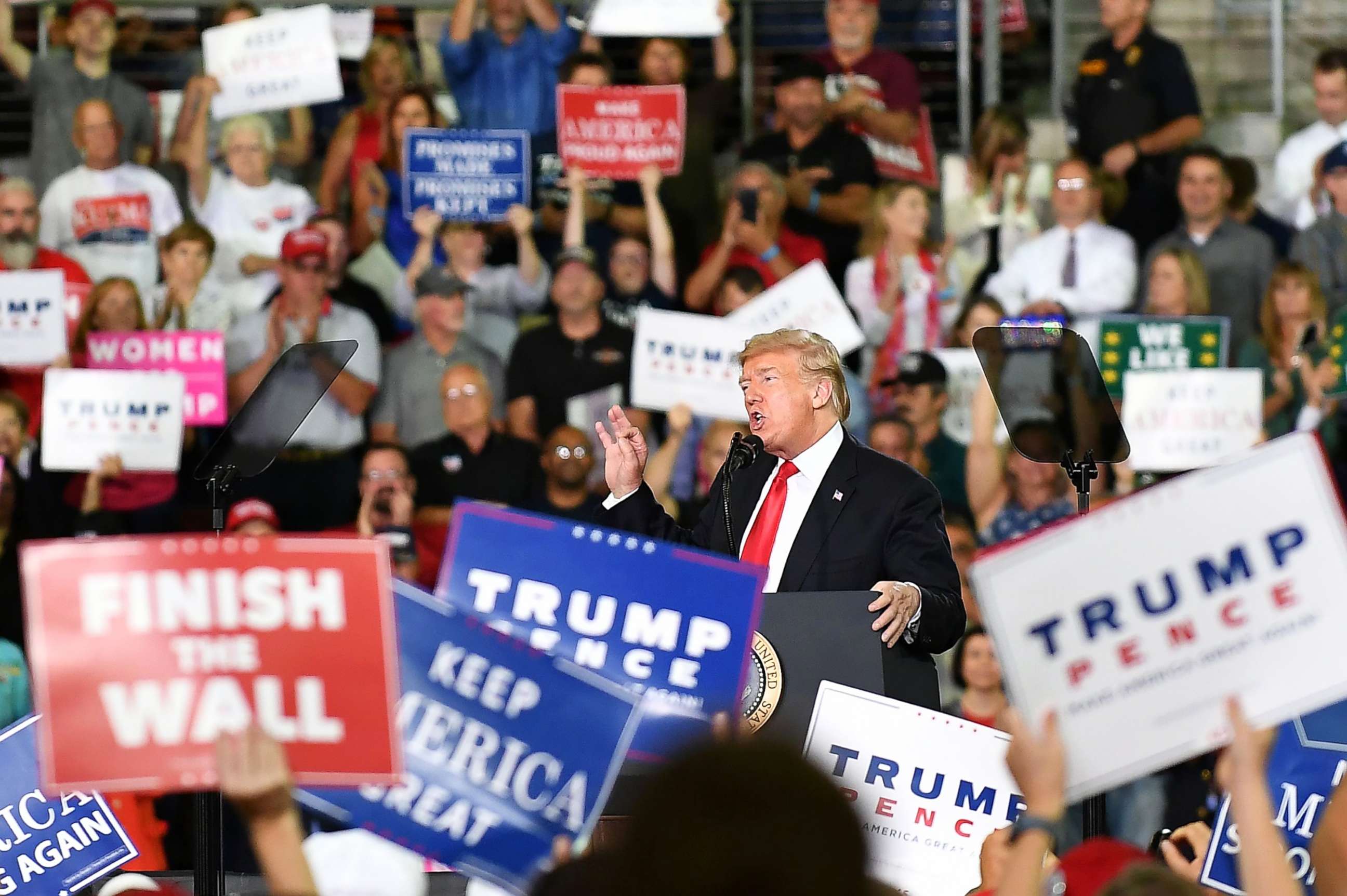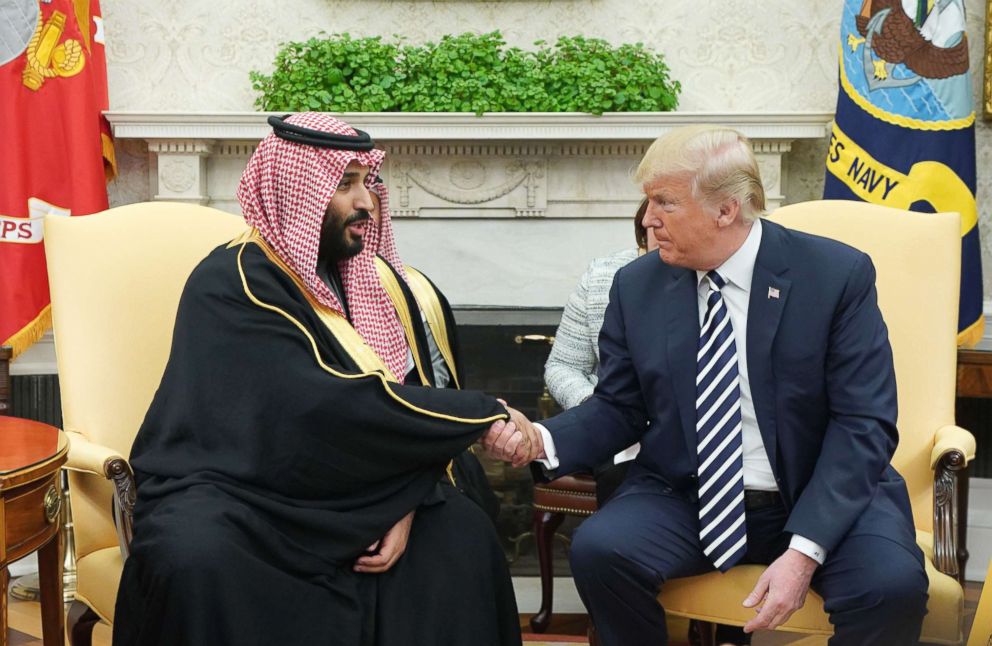Fact Check Friday: Trump unplugged and untrue, from his Medicare op-ed to 'Da Nang Dick' to Saudi arms sales
ABC's weekly White House fact check.
We're just about three weeks from the midterms and President Donald Trump has ramped up his media profile in the past few weeks in ways we haven't seen since his presidential campaign.
He's doing "Make American Great Again" rallies nearly every other night, interviews with newspapers and news magazines, writing op-eds, holding lengthy press conferences and even calling into Fox News for a 45-minute interview over the phone. But with all that exposure comes plenty of falsehoods.
Welcome to Fact Check Friday.
The Op-Ed
President Trump's highly contested op-ed on health care in USA Today faced so much backlash and was so misleading the paper responded by publishing a lengthy fact check of its own the next day.
In fact, nearly a dozen media outlets published fact checks.
And Democrats, who plan on running on the issue of health care in November, are pushing back in full force. Senate Minority Leader Chuck Schumer marked up the entire document in red pen.
The criticisms begin with Trump's very first claim that a new Democratic proposal called "Medicare for All," (which is essentially a single-payer health care plan) would "end Medicare as we know it and take away benefits that seniors have paid for their entire lives."
In fact, the bill proposed by Sen. Bernie Sanders, the Vermont Independent, actually stipulates that seniors would be taken care of first and that the rest of the American population would be covered in stages over the next four years.
And then there's President Trump's next claim: that the plan would cost the federal government $32.6 trillion over 10 years. That's an accurate estimate, but it's incomplete.

What the president fails to mention is that when the federal government takes on a majority of health care costs it offsets the costs incurred by individuals and state governments. So, to suggest that the cost would increase by $32 trillion is totally misleading. Supporters of the measure contend it’s possible overall health care costs would not increase at all.
The overall point is that there are honest debates to be had about health care.
This op-ed by the president is not the way to start an honest debate, his critics charge.
‘Da Nang Dick’
Still incensed by what he has called a Democratic "hoax" to destroy his Supreme Court pick, President Trump fabricated a detailed story about Democratic Sen. Richard Blumenthal's military service this week, which he appeared to base loosely on the Democratic senator's own admission that he'd previously misspoken about serving in Vietnam.
Referring to the former Marine reservist as "Da Nang Dick," Trump seemed to invent a story out of whole cloth in an interview with the Washington Examiner, falsely claiming the account came from Sen. Blumenthal's own mouth.
"But he apologized... Crying, bawling, because he conned the public when he was Attorney General of Connecticut for 15 years, talking about, 'As I went to Da Nang, bullets left and right,'" Trump told the paper. "'My friends going down.'” Meaning being killed."
"Da Nang Dick. We call him Da Nang because it was Da Nang province. He said, 'When I was Da Nang province, going up the hill, my buddies falling left and right.'"
In fact, there is no evidence Blumenthal said any of those things.
Blumenthal has acknowledged that he has in the past "misspoken" about his service. In a 2010 news conference, he apologized for giving the false impression that he served in Vietnam during his years as a Marine reservist.
So Trump is correct when he says Blumenthal lied about his service.
But, Blumenthal never told stories of bullets whizzing by his head, he never cried (an embellishment Trump drops in many of his falsehoods) and he never spoke about "buddies falling left and right." He also never claimed to be in Da Nang – which is a city, not a province.
‘They're spending $110 billion’
President Trump said this week he would be reluctant to punish Saudi Arabia's leaders if they're found responsible for murdering Washington Post contributor Jamal Khashoggi, explaining he didn't want to disrupt a deal for Saudis to buy $110 billion in U.S. military arms.

“I know they’re [senators] talking about different kinds of sanctions, but they’re [Saudi Arabia] spending $110 billion on military equipment and on things that create jobs, like jobs and others for this country, Trump told reporters on Thursday. "I don’t like the concept of stopping an investment of $110 billion into the United States.”
Aside from the president's abrupt acquiescence in the face of an accusation of horrendous human rights abuses, the problem with his statement is that there is no firm deal for Saudi Arabia to buy $110 billion in American arms.
The reality is that the U.S. is nowhere close to receiving that kind of money from Saudi Arabia, at least for now.
Much of the $110 billion is tied up in "memorandums of intent" – agreements to buy things in the future, rather than actual contracts and goods in the pipeline. Nine months after the president first inked his deal he acknowledged only $12.5 billion in aircraft, missiles, and ships actually had been purchased.
That's a far cry from $110 billion.
Meantime, negotiations for the purchase of a $15 billion anti-missile system known as THAAD, still isn’t set in stone. And that's after the U.S. agreed to drop the price by 20 percent.




